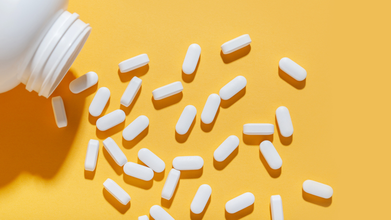- Health Conditions A-Z
- Health & Wellness
- Nutrition
- Fitness
- Health News
- Ayurveda
- Videos
- Medicine A-Z
- Parenting
Real vs. Fake: How to Ensure Your Protein Powder Isn't A Counterfeit

Protein Powder (Credit: Canva)
Protein is fundamental to our body's structure and function. Each day, we lose approximately 200 grams of amino acids, the building blocks of proteins. To maintain optimal health, it's recommended to consume about 1 gram of protein per kilogram of body weight. While it's possible to meet these requirements through a balanced diet—providing roughly 60 grams of protein from food—many people turn to protein supplements for convenience, particularly in fitness circles.
One crucial factor in protein consumption is bioavailability, which refers to how effectively the body can absorb and utilize the protein consumed. Whole food sources typically offer higher bioavailability compared to supplements. Animal-based proteins generally contain all nine essential amino acids our bodies can't produce, whereas many plant-based proteins may lack one or two. For those relying on vegetarian diets, it's important to combine different protein sources to ensure a complete amino acid profile.
Risks Of Protein Deficiency
Insufficient protein intake can significantly hinder bodily functions, affecting growth, hair health, and nail strength. Historically, inadequate nutrition has led to severe health implications; for instance, life expectancy in 1947 was just 32 years, while modern averages have improved to around 67 years for men. Despite these advancements, a balanced diet remains essential for maintaining health and vitality.In recent years, the protein supplement market in India has witnessed significant growth, projected to expand from $91.8 million in 2023 to $120.3 million by 2028. However, the industry is also fraught with challenges, particularly regarding the authenticity of products. Reports suggest that around 90% of protein powders in India may be adulterated, which can severely undermine their effectiveness.
How To Identify Fake Protein Powders
Recognizing the difference between genuine and counterfeit protein supplements is crucial. Here are some tips to ensure you're getting a quality product:1. Examine the Label: Authentic protein powders will clearly list their ingredients, including the source of protein and any additives. Look for reputable brands with transparency about their production processes.
2. Check the Amino Acid Profile: Quality protein supplements will provide a complete amino acid profile. Be wary of products lacking this information, as it may indicate inferior quality.
3. Observe Texture and Consistency: Genuine protein powders should have a consistent texture and color. Look out for clumping, discoloration, or foreign particles, which can signal contamination or poor quality.
4. Smell Test: An unusual or strong smell may indicate spoilage or the presence of harmful additives. Quality protein supplements typically have a neutral scent.
5. Third-Party Testing: Seek out brands that undergo third-party testing for purity and potency. Certifications from recognized organizations can add a layer of assurance regarding the product’s authenticity.
Vitamin D Supplements Under Scrutiny As It Fails Safety Test

Credits: iStock
In many parts of the world, sun is again unseen, thanks to the extended winters. Does this mean you should worry about your vitamin D levels? Yes. However, it does not mean that everyone needs to rush to the nearest pharmacy for supplements.
Health and Me had previously reported on the adverse impact of overdosing on vitamin D supplements. Now, a new study by The Austrian Association for Consumer Information (VKI), and Stiftung Warentest, a German consumer organization tested 22 supplements and found that only two were suitable for preventing a deficiency.
Read: NHS Doctors Warn Vitamin D Users About Four Key Overdose Symptoms
Which Vitamin D Supplements Were Tested?
- Abbey Vitamin D3 2500 IU + Zinc + Selenium
- Abtei Vitamin D3 3000 IU
- Alsiroyal Vitamin D3 plant-based + K2 melt-in-the-mouth tablets
- Cefavit D3 1000 IU
- Cefavit D3 K2 Mg 2000
- Dekristolvit D3 2000 IU
- Dekristolvit D3 4000 IU
- dm Mivolis Vitamin D3 1000 IU
- Doppelherz Active Vitamin D3 2000 IU
- Doppelherz System Vitamin D3 7000 IU
- GSE Vitamin D
- GSE Vitamin D3
- Hübner Vitamin D3 800 IU
- Hübner Vitamin D3 Compact 2000 IU
- Natural Elements Vitamin D3/K2 Drops
- Raab Vitalfood D3 + K2 vitamins
- Rotbäckchen Vital Vitamin D
- Sanotact Vitamin D 3200 IU
- Taxofit Vitamin D3 2500 IU
- Tetesept Vitamin D3 10000 weekly depot
- Tetesept Vitamin D3 2000 high dosage
- Vigantolvit Vitamin D3 2000 IU
Of these, only GSE and Rotbäckchen were noted to be safe for use. Markus Herrmann, head of the Institute of Medical and Chemical Laboratory Diagnostics at the Medical University of Graz, said, "Based on the available data, reputable professional societies do not recommend vitamin D supplementation for healthy adults."
VKI found that 20 out of the 22 products tested were overdose. The worst offenders, according to the study were products from: Hübner, Dekristolvit, Alsiroyal, and Sanotact. Their recommended daily dose exceeded that of the GSE product, which is considered effective, by a factor of 20.
What Are The Recommendations On Vitamin D?
VKI generally advises against the use of vitamin D supplements without consulting doctor. However, the belief that vitamin D is essential still persist. Who are at most risk? The answer is: children, elderly, pregnant women, and people who do not get much sun exposure or cover their skin are most likely to be deficient.
Read: After NHS Warning On Vitamin D, Turkish Expert Too Warns Of Poisoning
Time Spent Under Sun In Summers Could Get You Through Winters
Vitamin D has unique characters that makes it different from vitamin C, another popular supplements. It is a steroid that acts as a hormone in the body and is one of the fat-soluble vitamin. This means, it could be stored in fat and muscles, that too for a relatively long time, says Herrmann.
People who spent a lot of time outdoors in summers only begin to deplete their vitamin D levels in February, which is almost the end of winters. Even after this, a few hours a week in fresh air and winter sunlight is enough to produce sufficient vitamin D again.
However, experts point out that because vitamin D is stored, this is what makes it difficult to be excreted, especially when the doses are high. It remains in the body and could harm the person.
Diljit Dosanjh Swears By This Green Juice to Power His 4am to 9pm Routine

Credits: Instagram
Diljit Dosanjh posted a reel dated December 11, where he flaunted his workout plan which starts at 4am and his day ends at 9pmDiljit Dosanjh Swears by This Green Juice to Power His 4am to 9am Workout. His secret to a long day is his 'green juice'. In the video itself, the 42-year-old actor and singer shared that he makes a green juice.
What Is Diljit Dosanjh's Green Juice?
He had shared once on his story in 2021 that he mixes neem and amla along with water for his green juice. The juice works best when consumed on an empty stomach. Why does this juice work?
Neem is loaded with benefits, and same is the case with amla. Neem is known for improving cardiovascular health, eyesight, liver health and the overall immune system. Amla on the hand contains nutrients like vitamin A, pyridoxine, riboflavin and minerals like sodium, potassium, carotene, calcium, copper, zinc, phosphorus, manganese, magnesium, and iron. Amla is also known to help with digestion and increase production of red blood cell.
What Are The Benefits Of Amla And Neem?
Amla or Indian gooseberry helps in diabetes control as they have soluble fiber in it and it dissolves quickly in the body. This also helps to slow down the rate at which your body absorbs sugar. Furthermore, it aids with digestion, and the vitamin A content in it helps with eye health. Amla is also rich in vitamin C, which helps in improving immunity and its antibacterial and anti-inflammatory properties helps furthermore with boosting health.
Neem, or scientifically called Azadirachta Indica contains chemicals that could help with diabetes control by reducing blood sugar levels, heal ulcers in the digestive tract, prevent pregnancy, kill bacteria, and prevent plaque from forming in the mouth.
What Does Diljit Dosanjh's Day Look Like?
He wakes up at 4am and his day begins with energy and powerhouse performances. His fitness regime includes a mix of cardio and weight training.
His day starts with cardio which includes:
Climbing Stairs
- Stand at the bottom of the staircase with your back straight.
- Step up with one foot, then bring the other foot up to the same step.
- Continue climbing at a steady pace, using the handrail if needed for balance.
- Walk back down carefully, keeping your steps controlled.
- Repeat for several rounds or for a set time.
Push Ups
- Start in a plank position with your hands placed slightly wider than shoulder-width.
- Keep your body in a straight line from head to heels.
- Bend your elbows and lower your chest toward the floor.
- Push through your palms to straighten your arms and return to the starting position.
- Repeat for the desired number of reps. Beginners can keep their knees on the floor.
Jumping Jacks
- Stand straight with your feet together and arms by your sides.
- Jump up, spreading your legs while raising your arms overhead.
- Jump again to bring your feet back together and arms down.
- Maintain a steady rhythm and breathe normally.
- Continue for a set number of reps or time.
His weight training includes:
Chest flys with dumbbells
- Lie flat on a bench or the floor, holding a dumbbell in each hand.
- Extend your arms above your chest with palms facing each other.
- Keep a slight bend in your elbows throughout the movement.
- Slowly lower your arms out to the sides until you feel a stretch in your chest.
- Bring the dumbbells back together above your chest in a controlled motion.
- Repeat for the desired number of reps.
Dumbbell overhead extensions
- Stand or sit upright, holding one dumbbell with both hands.
- Raise the dumbbell overhead, arms fully extended.
- Keep your elbows close to your ears.
- Slowly bend your elbows to lower the dumbbell behind your head.
- Extend your arms to lift the dumbbell back to the starting position.
- Repeat while keeping your core tight and back straight.
His workout regime ends with light yoga, with cobra pose.
Robert F Kennedy Jr Lost 20 Pounds In 20 Days While Eating THIS Diet

(Credit-Associated Press)
Kennedy Jr. recently revealed how he lost 20 pounds in 20 days on a highly restrictive diet focused completely on meats and fermented foods.
In an interview with USA Today’s “The Excerpt” podcast, the US Health and Human Services Secretary revealed that he followed the diet the whole day. “That may not be right for other people, but I lost 40 percent of my visceral fat within a month”. His eating habits have been highlighted before; previous interviews revealed he ate a steak along with fermented vegetables for breakfast.
However, is carnivorous die ideal for weight loss and are there any major concerns related to solely living on different kinds of meats?
Is A Carnivorous Diet Health?
A "carnivore" diet contains only animal products such as meat, eggs, and dairy. Kennedy Jr. also mentioned fermented foods, which include sauerkraut, yogurt, or miso, that are made using natural bacteria. While Kennedy Jr. claimed he lost 20 pounds in 20 days and felt more mentally clear, he also admitted some of it could be a ‘placebo effect.’
The leader of the MAHA movement reportedly eats steak and fermented vegetables for breakfast and even asks his wife, Cheryl Hines, to carry bags of sauerkraut in her purse when they go out to dinner, according to an interview by the CUT.
However, according to the British Heart Foundation, while some people use the carnivore diet to lose weight quickly, health experts warn that it could cause serious long-term damage to your body.
Does A Carnivorous Diet Aid In Weight Loss?
The carnivore diet works on the principle of ketosis, where the body burns fat for fuel because there are no carbs available. While you might lose weight at first, experts say this is likely because protein makes you feel full, so you naturally eat less. Also because you’ve cut out high-calorie snacks like cake, chips, and alcohol.
However, because the diet is so restrictive, most people find it impossible to stick to for very long. While the all-meat part of his diet is controversial, experts say the fermented foods he eats do have proven benefits.
How Does A Carnivorous Diet Affect Our Health?
The carnivore diet is heavy in red meat and dairy, which are packed with saturated fats. Consuming too much of these fats can lead to:
High Cholesterol
This increases your risk of heart attacks and strokes, as the bad cholesterol or LDL can block arteries and restrict blood flow from organs
High Blood Pressure
Many processed meats (like bacon) are high in salt, which strains your heart. When your salt consumption is high, it causes water retention, which puts pressure on your blood vessel walls, which eventually weakens them.
Kidney Stress
Eating massive amounts of protein forces your kidneys to work much harder to process the waste.
Which can lead to kidney stones, according to National Kidney Foundation.
Kennedy’s diet is much more extreme than the official advice he helped create. He was quick
However, Kennedy Jr.’s personal diet plan is much stricter than the one he helped create for millions of Americans while in office. The official was quick to inform viewers that he is not trying to be a ‘role model’ for everyone, noting that what works for him might not be right for others.
© 2024 Bennett, Coleman & Company Limited

